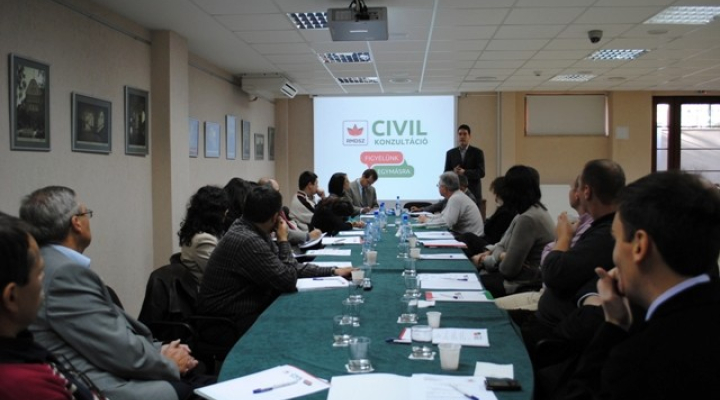Start of the Transylvanian Hungarian Civic Consultation
The Democratic Alliance of Hungarians in Romania has started a series of public consultations under the title Transylvanian Hungarian Civic Consultation, in order to implicate Hungarian non-governmental organizations from Transylvania into the legislative process, because it is important that the practical experience of these organizations to be reflected by the legislation as well.
The first meeting of the Consultation process took place today at the headquarters of the School Foundation in Cluj, Romania where DAHR Secretary General Péter Kovács, MP Károly Kerekes, MEP Csaba Sógor and program coordinator Gabriella Tonk met with the representatives of the organizations active in the field of social assistance.
Péter Kovács praised the professional competence of the non-governmental sector and presented the general guidelines of the consultation process. DAHR’s Secretary General considers that this is aimed at creating a steady dialogue with organizations active in different professional fields, as well as incorporating the opinion of the civil society into the upcoming legislative amendments. The intent is to make the Alliance’s parliamentary work more effective. “We would like the laws not to contradict everyday practices, this is why it is important for specialists to make their views known about the consequences of changing old or implementing new legislation” – said the Secretary General.
MP Károly Kerekes made a presentation entitled “Regulations of the Romanian system of social assistance: expected changes in the time of budgetary restraints”. He presented modifications proposed in the new framework of the social system that is currently in the parliamentary committees. He said that the modification of the framework implies the adoption of further bills; this is why the Consultation will have an important role in the future. The new regulation, on the other hand, pays attention to several currently neglected situations, like the one of the homeless and people with disabilities – said Kerekes.
DAHR’s MEP Csaba Sógor said at the meeting, that well functioning social systems arose where the state conducts a regular dialogue with the civic sector. Making reference to several examples of European good practices, Sógor presented the social dimensions of the EU2020 strategy and the commitments of Romania in reaching the proposed goals. The MEP feels that the main problem in Romania is that political actors only plan for periods of one mandate. The role of the civil society is to overcome this anomaly and ensure stability for local communities through adherence to the EU’s long-term plans and financial cycles.
During the course of the meeting András Farkas, president of the Pont Group made a presentation about the system of European funding, the experiences of the current financial cycle and upcoming challenges. He also spoke about the usage of EU funds, the reasons of their notoriously low level. László Ludescher, director of the Alba Iulia Caritas spoke about the situation of civic social services and the local public-private partnerships and made some recommendations based on the experiences of the Caritas network.
The first meeting of the Consultation ended with the finalization of the cooperation methods and the summing-up of the ideas about the modification of the framework of the social system. Participants agreed to consult each other on legislation that is on the Government and Parliament’s agenda and DAHR will incorporate the best practices of the Hungarian organizations into its amendments. They also convened, that the Secretariat General of DAHR’s will mediate between non-governmental organizations and local authorities in view of organizing local or regional “NGO fairs”.











